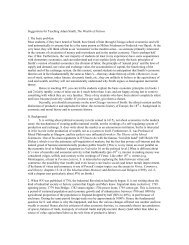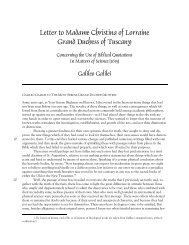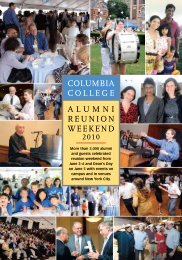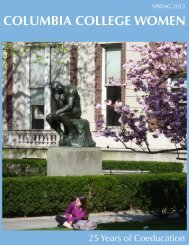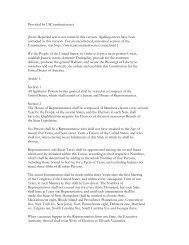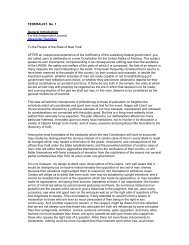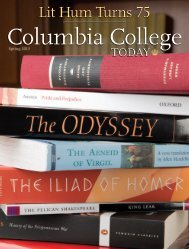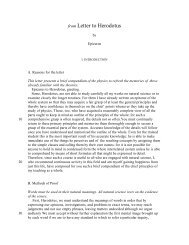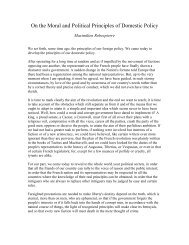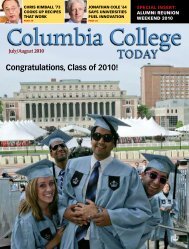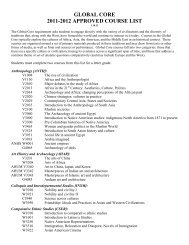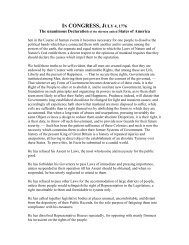Download this issue as a PDF - Columbia College - Columbia ...
Download this issue as a PDF - Columbia College - Columbia ...
Download this issue as a PDF - Columbia College - Columbia ...
You also want an ePaper? Increase the reach of your titles
YUMPU automatically turns print PDFs into web optimized ePapers that Google loves.
JOEL KLEIN ’67<br />
COLUMBIA COLLEGE TODAY<br />
COLUMBIA COLLEGE TODAY JOEL KLEIN ’67<br />
“I still feel like America is falling down in<br />
education, particularly for the most challenged kids.”<br />
The year w<strong>as</strong> 1963, and the ambitious teenager w<strong>as</strong> just<br />
beginning to display the drive that later would empower<br />
him to challenge monoliths and monopolies,<br />
from mighty Microsoft to powerful teachers’ unions.<br />
That moment almost 50 years ago also exposed Klein’s n<strong>as</strong>cent<br />
appreciation for the transformative power of education.<br />
Decades later, <strong>as</strong> chancellor of the New York City Department<br />
of Education, the nation’s largest school system, that appreciation<br />
gave rise to a conviction to champion kids — much like himself<br />
— whose only foothold out of tough circumstances could be<br />
found in a cl<strong>as</strong>sroom. But education, while Klein’s signature <strong>issue</strong>,<br />
represents only one facet of an extraordinary and somewhat<br />
dizzying career. He h<strong>as</strong> morphed from Beltway Democratic insider,<br />
vetting a Supreme Court justice for the Clinton administration<br />
and taking on Bill Gates in a monumental anti-trust c<strong>as</strong>e, into<br />
one of the country’s leading and most controversial educational<br />
reformers — only to vault early l<strong>as</strong>t year into the executive towers<br />
of the conservative-leaning media titan Rupert Murdoch.<br />
“My resume looks like it kind of got mixed and matched from<br />
three or four people,” the 65-year-old Klein says while taking a<br />
break over a cup of hot tea in his Midtown office at News Corporation<br />
headquarters.<br />
He began with law, graduating from Harvard in 1971 and<br />
working <strong>as</strong> a law clerk, first for David Bazelon, chief judge of the<br />
U.S. Court of Appeals for the District of <strong>Columbia</strong> Circuit, and<br />
then for Justice Lewis Powell of the U.S. Supreme Court. Following<br />
work at several law firms, in 1981 he co-founded a boutique<br />
D.C. firm, where he made his mark <strong>as</strong> a litigator: Klein argued 11<br />
c<strong>as</strong>es before the Supreme Court, and won nine of them.<br />
When people talk about Klein, they describe a man who<br />
thrives amidst adversity, all the more when many eyes are trained<br />
on him. One of the people who worked in Klein’s law firm in the<br />
1980s w<strong>as</strong> Peter Scheer, now the executive director of the First<br />
Amendment Coalition.<br />
“What he’s especially good at is being able to think very clearly<br />
in the midst of a crisis, where there’s a lot of pressure and the world<br />
is watching,” Scheer told Politico l<strong>as</strong>t year. “He’s able to stay focused,<br />
and he’s almost stimulated by all that pressure and media<br />
attention.”<br />
Those attributes are likely what caught the eye of President<br />
Bill Clinton in 1993 when he convinced Klein to become deputy<br />
White House counsel, t<strong>as</strong>king him with guiding the nomination<br />
process of Ruth Bader Ginsburg ’59L to the Supreme Court. He<br />
also oversaw the Clinton White House’s responses to the Whitewater<br />
inquiry.<br />
Being tapped by Clinton caught Klein off-guard. “It struck me<br />
<strong>as</strong> strange because I’m not a political guy,” he recalls. “There w<strong>as</strong><br />
a certain amount of apprehension. I mean, the White House is a<br />
very hothouse place and [the people there have] very sharp political<br />
elbows.”<br />
Klein’s ability to more than hold his own in such a setting<br />
would come into play in his next posting, in 1995, to the Justice<br />
Department. Within two years he w<strong>as</strong> named chief of the antitrust<br />
division, where he challenged Microsoft’s monopoly in<br />
what Forbes magazine called “one of the largest and most dramatic<br />
antitrust battles in the nation’s history.”<br />
In June 2000, after a federal judge ruled to break Microsoft into<br />
two parts, Klein sat with Jim Lehrer of PBS and reflected upon<br />
the victory. “I do think the notion that anything goes, even in the<br />
new high-tech economy, is a notion that is very corrosive and insidious,”<br />
Klein said. “It will be harmful to our markets, harmful<br />
to our consumers and ultimately harmful to our economy. When<br />
you use economic power to coerce people to stay out of the market,<br />
to b<strong>as</strong>ically tie up distribution channels, when that occurs ...<br />
you can count on the United States Department of Justice and I<br />
believe the federal courts [should] put a stop to it.”<br />
The victory w<strong>as</strong> reversed on appeal, and by then the Bush<br />
administration had no interest in pursuing the c<strong>as</strong>e. But Klein’s<br />
reputation <strong>as</strong> the guy who went toe-to-toe with a corporation<br />
then valued at $619 billion — more than Apple is today — never<br />
waned. In his four years at the head of antitrust, he established<br />
a record to stand on: Through 220 criminal price-fixing c<strong>as</strong>es, 52<br />
executives were sent to prison, corporations paid $1.7 billion in<br />
fines and individuals paid an additional $21 million. Klein also<br />
blocked or altered about 170 proposed mergers.<br />
The Los Angeles Times dubbed Klein a “giant killer.” And in <strong>as</strong>sessing<br />
his legacy at the Justice Department, The New York Times<br />
heaped praise on him in a September 24, 2000, editorial: “Mr.<br />
Klein blocked a series of mergers — between Lockheed Martin<br />
and Northrop Grumman, WorldCom and Sprint, and Northwest<br />
and Continental — that had the potential to harm consumers. He<br />
also broke up price-fixing cartels, notably between international<br />
vitamin companies. He h<strong>as</strong> not forged bold new antitrust principles<br />
or direction. What he h<strong>as</strong> done is take antitrust enforcement<br />
seriously. For that alone he warrants the nation’s gratitude.”<br />
For many years while the high-powered lawyer w<strong>as</strong> racking<br />
up legal victories toiling in W<strong>as</strong>hington, he also played<br />
on a different court with the same tenacity. The b<strong>as</strong>ketball<br />
league at the W<strong>as</strong>hington Y had a roster of lawyers that included<br />
Larry Lucchino, now CEO of the Boston Red Sox.<br />
“We played in a serious league,” says Klein, who stands 5-foot-<br />
6. “I’m lucky I didn’t break a leg.”<br />
Between hoops and law, Klein kindled his p<strong>as</strong>sion for education,<br />
teaching at Georgetown Law School. Unlike most adjunct<br />
professors, Klein didn’t opt for an evening seminar; he taught a<br />
daytime cl<strong>as</strong>s in civil procedure to first-year students.<br />
One of his students w<strong>as</strong> Michael K. Powell, who later w<strong>as</strong><br />
chairman of the Federal Communications Commission and is the<br />
son of former Secretary of State Colin Powell. “Joel w<strong>as</strong> an extraordinary<br />
teacher who had a m<strong>as</strong>tery of complex subjects and<br />
the ability to make them simple,” Powell told The New York Times<br />
in 2002.<br />
Teaching w<strong>as</strong> not new for Klein. When he w<strong>as</strong> at Harvard in<br />
the late ’60s, he had taken a short leave to take education cl<strong>as</strong>ses<br />
at NYU and to teach math to sixth-graders at a public school in<br />
his old Queens neighborhood. But despite these leanings toward<br />
the cl<strong>as</strong>sroom and a chalkboard, he says he w<strong>as</strong> flustered when<br />
he answered a phone call in 2002 and heard the voice of New<br />
York City Mayor Michael Bloomberg, <strong>as</strong>king him to consider tak-<br />
ing the post of schools chancellor.<br />
“I said, ‘Mike, you must have the wrong name. You clearly got<br />
one name too few in your Rolodex.’ He said, ‘No, no, we were<br />
thinking of people outside the box,’” Klein recalls.<br />
At 56, the former corporate lawyer and trustbuster found his<br />
calling: To take charge of a public school system of 1.1 million students<br />
and to grapple with the complex realities and controversies<br />
of urban education.<br />
“He h<strong>as</strong> the leadership skills,” Bloomberg said at a news conference<br />
introducing Klein in summer 2002. “He h<strong>as</strong> the intergovernmental<br />
skills. He h<strong>as</strong> the feeling and comp<strong>as</strong>sion for people.<br />
He is incorruptible. He is a visionary. And I believe that he will<br />
deliver to <strong>this</strong> city what we promised, a quality education for all<br />
of our children.”<br />
Bloomberg handed Klein the reins of a school system beleaguered<br />
by low test scores, high dropout rates and a shortage of<br />
teachers — a tough <strong>as</strong>signment that struck a chord not only with<br />
Klein’s politics but also with his own p<strong>as</strong>t.<br />
“I still feel like America is falling down in education, particularly<br />
for the most challenged kids,” Klein said recently, when<br />
<strong>as</strong>ked to look back on his tenure <strong>as</strong> chancellor. “And <strong>this</strong> w<strong>as</strong> a<br />
chance to really give back to the city and the school system that<br />
had given me so much. I wouldn’t be here today if it weren’t for<br />
what teachers in Astoria did for me.” (Klein in fact credits his<br />
physics teacher, Sidney Harris, with changing the arc of his life:<br />
“In my junior year, he took me <strong>as</strong>ide and said, ‘You’re doing fine,<br />
but you can do better. Why don’t you stay after school and we’ll<br />
study Einstein’s theory of relativity, which will prove to you that<br />
you can play <strong>this</strong> game at a different level.’” Harris also pushed<br />
him to apply to the <strong>College</strong> rather than the obvious choice of<br />
CUNY’s campus in nearby Flushing.)<br />
As schools chancellor from 2002–10, Klein gave more power to<br />
principals and pushed for accountability, stamping schools with<br />
A-through-F grades in annual report cards, taking a stand against<br />
the widespread practice of social promotion of students up the<br />
grade levels and making city schools a model for data-driven<br />
teaching and policymaking. He also created more than 300 new<br />
small schools and charter schools for parents to choose from.<br />
“I’m a big, big believer, whether it’s for my children or anybody<br />
else’s children, that people want choice,” Klein says. “I used<br />
to <strong>as</strong>k people all the time, ‘Of the 1,500 schools in New York City,<br />
how many would you send your own kids to?’”<br />
Time and again, he hit on <strong>this</strong> point, allying himself with the<br />
schoolchildren and their parents’ hopes and dreams for them.<br />
“Whose kids should go to the schools we wouldn’t send our own<br />
kids to?” he <strong>as</strong>ks. “Whatever community you live in, whatever<br />
your economic circumstances, you want your kid to have a shot.<br />
And education is one of those places where you can change lives.<br />
The politics of W<strong>as</strong>hington — those sharp elbows — served <strong>as</strong><br />
the ideal boot camp for the intensity, unrelenting media scrutiny<br />
and controversy that came with leading a huge public school system.<br />
Not one to shy from confrontation, Klein attacked the city’s<br />
Klein participates in a ribbon-cutting ceremony at the opening of a school in Middle Village, Queens, in 2010.<br />
PHOTO: COURTESY JOEL KLEIN ’67<br />
FALL 2012<br />
30<br />
FALL 2012<br />
31



